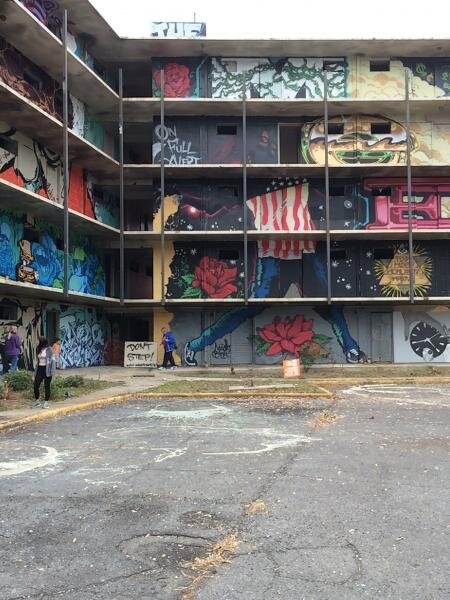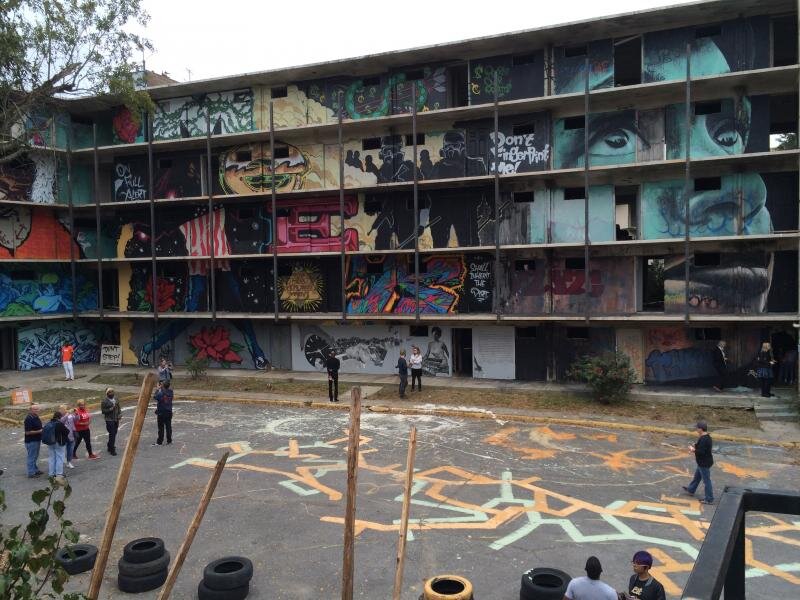What Are Prospect's Prospects?

What Prospect.4 could learn from Exhibit Be.
[Updated] When’s the last time you heard of people jumping the fence to see art? Prospect.3 has passed almost unnoticed—it closes this weekend—while Exihibit Be got word of mouth and was so packed for its final day Monday that people who were shut out found their own way in. It helped, to be fair, that Dead Prez and Erykah Badu gave the final weekend of Exhibit Be a little extra juice.
What little I saw of Prospect.3 was good, and I appreciated being able to see a number of paintings by Jean-Michel Basquiat in one room. But despite its sprawl, Prospect.3 was neither the event that Prospect.1 or Exhibit Be was. There was no buzz in person or on social media, and the differences between Prospect.3 and Exhibit Be might point the way forward for Prospect.4.
Prospect.4 should aim for event status, with each piece and show trying to hit a home run. Prospect.1’s signature piece was an ark built in the Lower Ninth Ward, and Exhibit Be remade an abandoned housing project on the West Bank into an art space. The audacity of the pieces and spectacle that accompanied their size and vision made them civic gatherings that attracted a cross section of the community. They mobilized people who would see art in galleries as well as those who wouldn’t, and they made the city feel dynamic as something large and imaginative existed that we all knew was temporary. Spaces were briefly beautiful, and you had to experience them while you could because they wouldn’t always be that way.
The most audacious thing I saw was Glenn Kaino’s “Tank” at the Contemporary Arts Center. His plastic casts of pieces of obsolete tanks dropped in the ocean were placed in beautiful, aquarium-like structures where different species of coral battled for territorial supremacy. Kaino’s piece works as a series of attractive objects as each—well, tank—houses a beautiful, organic mix of colors created by the coral in conflict, and the idea that generated the work is richly ironic. For me, it is additionally resonant as the individual aquariums make conflict look appealing, but the tanks are all connected to the tubes and pipes and filters and generators—the less sexy structures behind the scenes that are integral to war.
Unfortunately, Kaino’s piece is hidden on the second floor of the CAC among shows of professional, career work. I loved Douglas Bourgeois’ mini-retrospective on the same floor and am happy for the attention it brought to his work, but Prospect.4 would have more impact if it didn’t have retrospectives. Even grand, ambitious failures would be better touchstones for conversation than works that could be comfortably housed in any gallery in the country.
That emphasis on spectacle may require a smaller Prospect.4 in terms of the number of shows, but that’s not a bad thing. I suspect there is nobody outside of Prospect New Orleans organizers and Doug MacCash who have seen all of Prospect.3, and the notion that I have to see 30 or so shows to really “see” Prospect.3 is sufficiently daunting that I suspect few started. If part of the idea was to create an art tourism destination, shows that could only be seen in New Orleans for a limited time would be a bigger draw. To that end, I would also end the P.3+ designation, which only dilutes the Prospect brand. As much as I like Jack Niven’s concentric circles on the side of lumber yard on Tchoupitoulas at Jefferson, it provokes few questions and seems largely decorative. I like that space coming to life, but if it’s a Prospect space, it seems like it could be used to display something bolder.
Finally, a simpler, more direct theme would help the shows be more than simply a collection of shows. Prospect.1 art for the most part had recovery as its theme or subtext, and it was interesting to see on the walls how national and international artists were at a different place on Katrina response curve than locals. Work from out of town was outraged six months after artists here had transitioned from outrage to acceptance, and much of the local work was about what comes next.
Exhibit Be had housing and the physical and mental places we live as a unifying theme, and it’s far more a part of the civic dialogue than Walker Percy’s The Moviegoer, which Prospect.3 executive director Franklin Sirmans used as a touchstone for the festival. Had Prospect.3 had gentrification or tourism as possible themes, the work would have joined the conversations that we’re having now instead of existing on sterile gallery walls in seeming vacuums.
The Prospect concept has struggled, partly because it started during a recession that hobbled it financially. The repercussions of that are still playing through the system as Prospect has become more modest and cost-efficient, but a modest art festival looks to the casual viewer a lot like just another day in the galleries. If Prospect.4 wants to get New Orleanians and national art tourists to pay attention, going bigger rather than smaller is the way forward.
Prospect.3 shows close this weekend. Go to Prospect New Orleans for a list of shows and galleries. The Ogden's Basquiat show and the CAC are a good place to get at least a taste of Prospect.3. See Doug MacCash's reviews at Nola.com for other noteworthy shows.
Updated 4:40 p.m.
The last day of Exhibit Be was Monday, not Saturday. The text has been changed to reflect the correction.








